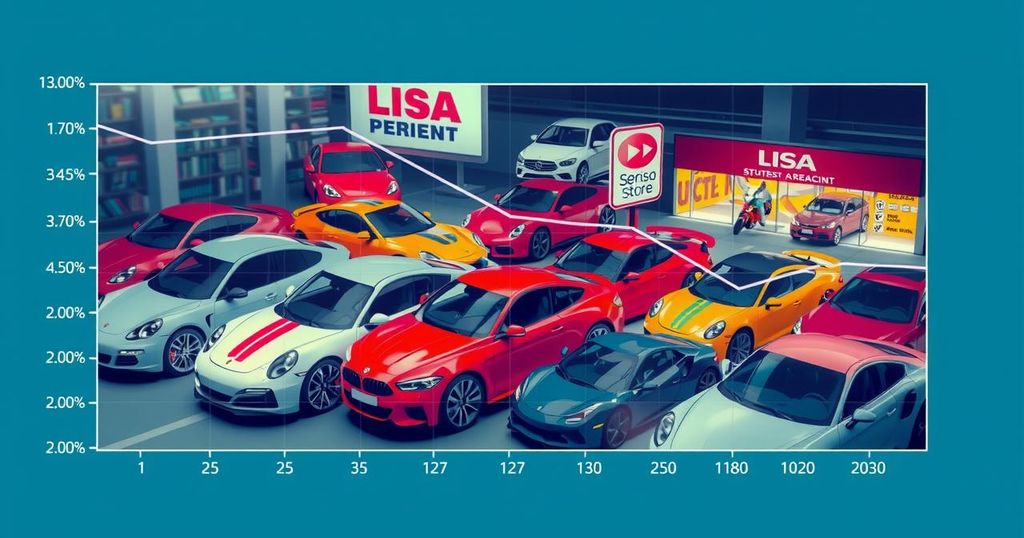General Motors’ Declining Prospects in China’s Automotive Market
General Motors faces significant financial losses in China, reporting a 19% drop in sales and a net income reduction of over $5 billion. As local brands dominate the market with electric vehicles, concerns grow regarding the sustainability of foreign automakers in this competitive landscape. Expert opinions suggest that without major adjustments, GM and its Western counterparts may need to consider exiting the Chinese market altogether.
In recent years, General Motors (GM) has experienced a significant downturn in its operations in China, once deemed the manufacturer’s most rewarding market. Following a period of substantial profits in North America, GM now faces a stark contrast with a reported 19% decline in sales in China. The company incurred losses amounting to $347 million through its joint ventures in the Country and forecasted a $5 billion reduction in net income tied to these issues. As domestic manufacturers thrive, enticing consumers with desirable electric vehicles, GM must reassess its long-term strategy in an increasingly competitive environment. Experts suggest GM may face challenges in continuing its partnership with local manufacturers as the current market dynamics raise pressing concerns about the sustainability of foreign automakers in China.
The transition towards electric vehicles (EVs) in China has transformed the automotive landscape, shifting consumer preferences towards homegrown brands. Once favored for their prestige, Western automakers now contend with a significant loss in market share, with Chinese brands now commanding approximately 70% of sales. The regulatory framework supporting EV production has further fueled local manufacturers’ success, complicating the prospects for traditional gasoline-powered vehicles often favored by Western brands. Despite optimism expressed by GM’s leadership regarding future prospects in the region, the prevailing sentiment among industry experts is one of skepticism about the possibility of a resurgence for foreign brands like GM.
In the wake of rising financial losses in its Chinese ventures, GM’s Chief Executive Officer, Mary Barra, has characterized the situation as “a very challenging environment” while expressing confidence in potential recovery strategies. However, Michael Dunne, an auto industry consultant, contends that GM’s golden years in China are behind them and remarks, “They’ll never have a comeback story.” Moreover, the shifts in consumer behavior, driven by government incentives advocating for electric vehicles, bolster the likelihood of further decline for Western firms.
Established joint ventures once considered essential for integrating into the Chinese market, are also under scrutiny, with key industry figures questioning the feasibility of continued partnerships. Notably, Stellantis, an automaker overseeing various major brands, has witnessed disastrous outcomes with its joint ventures, raising alarms about the viability of similar strategies among other Western companies. Bill Russo, an expert in the automotive field, emphasizes the critical importance of maintaining a presence in China despite current setbacks, warning that abandoning the lucrative market could have dire consequences for Western automakers.
Overall, General Motors and other Western automotive brands face substantial hurdles as they navigate a market that has shifted decisively towards domestic electric vehicle production.
The article examines the shifting dynamics within the global automotive market, particularly focusing on General Motors’ troubled trajectory in China. It provides insight into how the once-rewarding market has morphed into a significant financial drain for the company. This background contextualizes the broader trends influencing consumer behavior, government policies supporting local manufacturers, and the challenges international firms encounter as they compete in an increasingly crowded marketplace. The transformation from traditional gasoline vehicles to electric models represents a critical shift impacting all major players in the industry.
In conclusion, General Motors’ predicament in China underscores the rapidly evolving automotive landscape where consumer preferences and government policies favor local manufacturers. With significant losses reported and challenging market conditions anticipated, GM, alongside other Western automakers, will need to reassess their strategies to remain viable in a market that has shifted toward electric vehicles. Experts warn that failure to adapt could lead to the complete withdrawal of these companies from what remains the world’s largest car market, with potentially severe long-term consequences for their global operations.
Original Source: www.cnn.com




Post Comment